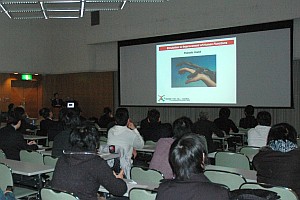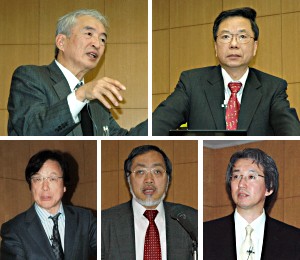25 March 2010
A symposium marking the opening of Nagoya University's Center for Micro-Nano Mechatronics drew participants from around Japan to hear a program of lectures on cutting-edge micro-nano research, setting the tone for the center's future international development.
Located in the Graduate School of Engineering on the main Higashiyama campus of Nagoya University, the Center for Micro-Nano Mechatronics was established in October 2009 under the leadership of its director, Toshio Fukuda. Drawing in researchers from a wide spectrum of specialisms ranging from micro-nano systems engineering, nanomaterials and surface engineering to immunology, cellular biology and regenerative medicine, the center aims to develop practical technologies at the micro-nano scale for interdisciplinary applications with a focus on novel functional materials and advanced biomedical engineering. This research backs up the educational remit of the Global Center of Excellence (GCOE) for Education and Research of Micro-Nano Mechatronics (μ-Mech GEAR), which was itself established in 2008 to teach and nurture the next generation of top-level researchers in micro-nano engineering.
 Located in the Graduate School of Engineering on the main Higashiyama campus of Nagoya University, the Center for Micro-Nano Mechatronics was established in October 2009 under the leadership of its director, Toshio Fukuda. Drawing in researchers from a wide spectrum of specialisms ranging from micro-nano systems engineering, nanomaterials and surface engineering to immunology, cellular biology and regenerative medicine, the center aims to develop practical technologies at the micro-nano scale for interdisciplinary applications with a focus on novel functional materials and advanced biomedical engineering. This research backs up the educational remit of the Global Center of Excellence (GCOE) for Education and Research of Micro-Nano Mechatronics (μ-Mech GEAR), which was itself established in 2008 to teach and nurture the next generation of top-level researchers in micro-nano engineering.
Located in the Graduate School of Engineering on the main Higashiyama campus of Nagoya University, the Center for Micro-Nano Mechatronics was established in October 2009 under the leadership of its director, Toshio Fukuda. Drawing in researchers from a wide spectrum of specialisms ranging from micro-nano systems engineering, nanomaterials and surface engineering to immunology, cellular biology and regenerative medicine, the center aims to develop practical technologies at the micro-nano scale for interdisciplinary applications with a focus on novel functional materials and advanced biomedical engineering. This research backs up the educational remit of the Global Center of Excellence (GCOE) for Education and Research of Micro-Nano Mechatronics (μ-Mech GEAR), which was itself established in 2008 to teach and nurture the next generation of top-level researchers in micro-nano engineering.
In the third contribution of the symposium, Minoru Ueda of the Program for Cellular Information at the Nagoya University Graduate School of Medicine, an expert in regenerative medicine, appealed for help from the engineers present in solving current problems in regenerative tissue growth. Whilst acknowledging that much progress had been made in the regeneration of hard structures like bone and teeth, he admitted to shortcomings in current protocols for realizing the regenerative growth of soft tissue such as nerves and blood vessels. One potential solution raised in the lecture was to incorporate ideas from micro-nanoscale engineering to build suitable scaffolds on which cells can be organized and encouraged to grow; the scaffolds could then either degrade or be incorporated into the tissue structure.
The seminar program was brought to its conclusion by Fumihito Arai of the Department of Bioengineering and Robotics at Tohoku University, who discussed a range of issues concerning the science of micro-nanorobotics and its applications to biomedical devices. In particular, he described a protocol for the manipulation of single cells with nanoscale pincers powered by magnetic fields. The attendees were then treated to a guided tour of the Center for Micro-Nano Mechatronics and its facilities.
 The theme of the topics presented at the symposium -- how research at the micro-nano level can be used to solve problems in medicinal and biomechanical engineering -- was a reflection of the official goals of the center, but the long-term plans are even more ambitious. "We are committed to developing a center for micro-nano research that is not limited by the duration of the μ-Mech GEAR GCOE or just to Nagoya University, but one that involves top researchers in the field from overseas institutions," explains Goro Obinata, a professor of biological systems control at the EcoTopia Science Institute, Nagoya University and a member of the Center for Micro-Nano Mechatronics. The international links necessary to realize this ambition are already being made. Nagoya University has held annual research workshops with staff and students from UCLA for several years, and will host a similar event with doctoral students from the Institute of Microsystem Technology at the University of Freiburg, Germany, in November 2010. On top of this, the center is also considering plans to send a detachment of its students later in the year for a week-long international young researchers training course involving students from Italy, Korea and Japan to be held at the Humanoid Robotics Institute at Waseda University, another highly prestigious Japanese university located in Tokyo. "As well as establishing a research center here at Nagoya, we want to set up a global research network in micro-nano engineering," says Obinata.
The theme of the topics presented at the symposium -- how research at the micro-nano level can be used to solve problems in medicinal and biomechanical engineering -- was a reflection of the official goals of the center, but the long-term plans are even more ambitious. "We are committed to developing a center for micro-nano research that is not limited by the duration of the μ-Mech GEAR GCOE or just to Nagoya University, but one that involves top researchers in the field from overseas institutions," explains Goro Obinata, a professor of biological systems control at the EcoTopia Science Institute, Nagoya University and a member of the Center for Micro-Nano Mechatronics. The international links necessary to realize this ambition are already being made. Nagoya University has held annual research workshops with staff and students from UCLA for several years, and will host a similar event with doctoral students from the Institute of Microsystem Technology at the University of Freiburg, Germany, in November 2010. On top of this, the center is also considering plans to send a detachment of its students later in the year for a week-long international young researchers training course involving students from Italy, Korea and Japan to be held at the Humanoid Robotics Institute at Waseda University, another highly prestigious Japanese university located in Tokyo. "As well as establishing a research center here at Nagoya, we want to set up a global research network in micro-nano engineering," says Obinata.